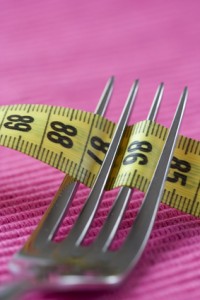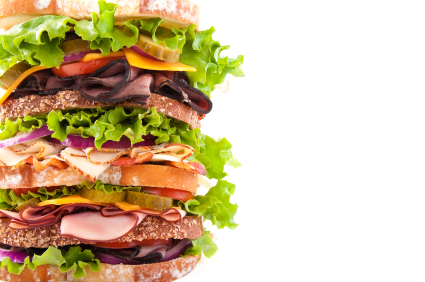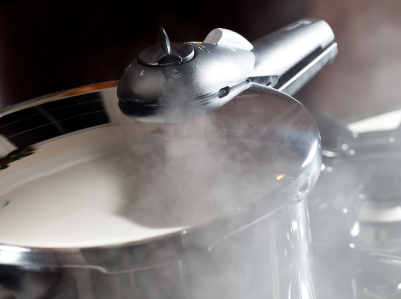Is daily stress adding to weight gain?
 According to a newly published online study, stress may be wreaking more than havoc on our bodies than previously reported. And, it’s quantifiable…at least with regard to weight gain.
According to a newly published online study, stress may be wreaking more than havoc on our bodies than previously reported. And, it’s quantifiable…at least with regard to weight gain.
I have certainly covered the impact of daily stressors on the hormone cortisol (think: craving comfort food, higher insulin levels and a midsection fat dump). However, study findings demonstrate that if women experience one or more stressful events the day before eating a fat-laden meal, it may slow the metabolism in such a way that over time leads to a whopping 11 extra pounds a year! Is prevention the best cure? Here’s what you need to know.
A bit of background…In this study, researchers asked fifty eight women to sample two separate calorie and fat dense meals consisting of eggs, turkey sausage, biscuits and gravy (940 calories, 60 g fat total, with the difference between the two meals saturated versus monounsaturated fats). To level the playing field and neutralize any possible factors that could affect the results, they were asked to forgo physical activity and alcohol, as well as vitamins and antioxidants in days leading up the study; they also fasted 12 hours after consuming three, standardized meals. On the day of the study visit, they completed several questionnaires assessing depression, physical activities and the degree of stress during the day before. Most of the stressors that the women reported were fairly common and interpersonal, for example arguments with colleagues or spouses, disagreements with close ones or work issues.
What they found….the more stressors that women reported having had experienced the day prior to the meal, the slower the metabolic rate and the higher the insulin levels following the fatty meal. (Metabolic rate refers to the amount of time required to burn calories and fat; insulin contributes to the way fat is stored.) More stress also meant less conversion of fat into fuel, meaning that these women were storing more fat. What’s more, the combination of depression history and a large number of stressors caused both an immediate spike in triglycerides following the high fat calorie meal and a two-fold slower decline in cortisol levels. Additionally, type of fat didn’t appear to influence these findings; regardless if it was saturated or monounsaturated, stress affected metabolism fairly equally.
One of the most interesting take-aways from the study is that the high -at, calorie-dense meals that the women consumed are equivalent to many common fast food choices, for example, a MacDonald’s Big Mac with cheese and medium fries provides 930 calories and 58 grams of fat. And, the researchers note that while most people eat every four to five hours, the women were only provided with one meal; this means that food choices appear to influence metabolic rates all day long. Yet another reason to keep healthy foods nearby when stressors hit.
Read MoreWednesday Bubble: Stories from the Sandwich Generation
I have long heard the term ‘Sandwich Generation’ tossed around as if it’s something that those of us who are in our fifties can’t escape. Indeed, women and men between the ages of 45 and 55, the generation I have always referred to as the Tailgaters (not quite Boomers but at the tail end) are increasingly finding themselves in a financial pickle as they try to navigate college tuition, aging parents who may need financial assistance and their own retirement. However, when I step back from the classic definition and remove the top layer, what I really see is an aspect of being part of the Sandwich that many people disregard: emotions.
In an interesting piece that ran in yesterday’s New York Times, journalist Jane Brody writes “moral obligations to assist one’s aging parents are commonly felt. They can leave adult children feeling overburdened and neglectful of their own families, personal needs and goals. Indeed, The New York Times for several years has devoted a blog entirely to this subject, The New Old Age.”
There it is; not only are we being pulled in various financial directions but we are also wedged between the emotional needs of ourselves, our family and our parents’.
How do you navigate this path successfully, without succumbing to emotional exhaustion? And when is it okay to step back and take a day to regroup and reenergize in the midst of a crisis? When is the deck so stacked that one wrong move can cause the entire sandwich to spill over onto the plate of life?
Earlier this year, I reported on findings from a nine-year study in almost 200 midlife women (ages 49 to 53) that supported what we all inherently know; this emotional burden may skew towards women in many cases and recovery for some, especially those who experience high levels of burnout, may be slow. The most important factors that promote a slow recovery include concurrent changes in life stress, work-related factors and coping ability/attitudes towards life. When women were divided into clusters reflecting patterns of burnout, the researchers found that high levels of life stress (e.g. concern for ailing parents, or concern for own health or their partner), coupled with a greater sensitivity to stress and job strain was a recipe for prolonged, worsening burnout. Women who had high levels of life stress but more control over their work environment were able to recover from burnout over time. Conversely, women with low levels of life stress, susceptibility to stress, anxiety and high levels of coping and a sense of control didn’t appear to be dealing with much burnout; the ability to draw on internal resources appeared to be protective in across a broad range of wellbeing indices.
I am in the midst of my own sandwich right now, balancing aging parents requiring medical and emotional attention with work with finances with a search for a new home. I am a burnout poster child for countless others who find themselves feeling helpless as they try to decide whether mustard or mayo will somehow make it all a bit more palatable.
Analogies aside, I would love to hear your personal story, the pathways you’ve engaged to find joy in the midst of an unbalanced life, the strategies you’ve used to redefine your role in the Sandwich that is life and aging parents and family and health and finances.
Where are you? And where do you want to be.
I want to hear from you my fellow Sandwichers. Share your recipe for regaining your power and balance, your tricks of the trade, your trials and tribulations, your journey navigating your way to happy. Post a comment below or write to me at flashfree111@gmail.com. Who knows? We may have a series in the making.
Read More
Wednesday Bubble Recap: Today’s Stress, Tomorrow’s Disability
Some of you may have noticed that I’ve been gone from Flashfree for a week now. I was attempting to take a staycation. Unfortunately, that attempt fell short of expectations. Sure, I didn’t turn off like I promised myself that I would. However, when the train leaves the station without a schedule, sometimes you simply have to hop on. And hence, I found myself hopping on at odd stops other than finding a path of true avoidance. And it’s left me feeling one way: stressed.
I was hoping to hop back on the Flashfree wagon full steam today with some interesting novel twist on the ‘pause but rather, I decided to repost this piece from earlier in the year. It can be hard to shut life down at times but the ramifications are pretty clear.
I’m planning on taking a day or two to remind myself. What about you? What’s your stress quotient like? If it’s out of control like mine and you are finding yourself barely coping at times, it’s probably an excellent call to step back and just stop. At the end of the day, the long term effects are more important than the short term reasons for the stress.
Mental stress takes its toll in so many ways; from depression and mental exhaustion to memory issues, sleep disruption, and reduced quality of life, to heart disease, diabetes and possibly musculoskeletal disease, stress literally sucks the life out of an individual. What’s more, while stress may’ take no prisoners,’ but its effects are not uniform and actually vary from person to person. As I’ve written previously, factors such as active coping and attitude are as important as a lack of control over one’s work environment. However, what about long-term consequences? According to a recent paper published online in the Journal of Gerontology, little has been written about the long-term consequences of mental stress and its toll as we grow older. And, the few studies that have examined it have actually been relatively short.
Fortunately, that paradigm has changed, In fact, when researchers examined the association between self-perceived stress and its later toll in roughly 5,500 men and women, the picture they found was not pretty. Stress symptoms were first evaluated when participants were between the ages of 45 and 58 and then reexamined four years later. They included factors such as stomach or chest pain, dizziness, anxiety, lack of enjoyment, sleep issues, lack of energy and a gloomy outlook, which were rated by frequency. Twenty-eight years later, daily living scales were used to assess the degree of disability in the same individuals; these included the ability to feed oneself, to dress, to get out of bed, prepare meals, shop, do laundry or do housework.
As mentioned, stress was inconsistent among the participants; some were profiled as having mostly negative reactions to work and depressiveness while others perceived a decline in their ability to focus and think. Some participants primarily reported sleep disturbances or physical symptoms such as chest pain, stomach ache and dizziness. Only a third reported having no stress symptoms in midlife, whereas up to a quarter reported that their stress was constant. Most importantly, constant stress in midlife was linked to significant challenges in performing the most basic of activities later in life — up to four times worse. Even more troubling? Constant stress was a deal breaker when it came to physical activity; these people had up to three times greater risk for not being able to walk a mere 1.2 miles!
Researchers say that it’s likely that “constant activation of stress responses lead to ‘wear and tear.” And while the health trajectory that leads from stress to disability is still unclear, what is clear is the need to intervene in midlife, take time to identify work stressors, change workloads and tasks, engage in regular physical activity and seek counseling if stress symptoms continue to interfere with life quality.
You only live in this body once; be sure to take care of it at all stages before lack of care takes a real toll.
Read More
Over or under? Work, stress and life
July is almost over. And it’s been a whirlwind of work, illness, tragedy and emotions. So much so that my instinct is to find a cabin in the woods and hide out for the month of August. This post from a few years ago seems more relevant than ever.
Results of a global survey (conducted several years ago by the Boston Consulting Group) suggested that women are more overworked, overextended, overstressed and underserved than ever. In fact, time demands are the number one challenge that women face in their lives.
Key findings included:
- Women are responsible for a large percentage of global income, owning 40% of all U.S. business and controlling over $12 trillion dollars in consumer spending (globally).
- In the U.S., almost 71% of women in the workforce are mothers, and over half have children under the age of one. Yet, they do most of the work at home as well (88% – grocery shopping; 85% – meal preparation; 84% laundry and cleaning; and 77%, household administration).
- 48% of women say that managing household finances is a major source of stress in their lives, while 81% are concerned about not having enough money for retirement.
- 47% say that time demands represent the “big stress in their lives,” with 45% expressing that they don’t have enough time for themselves.
One of the most disturbing finding deals with women’s expectations of themselves. In fact 44% of those polled said that they rarely or never feel powerful. Hmmm, why is this? Why is it that we feel powerless when we control such a significant portion of the global economy and virtually run our world, both inside and outside the home? And where is the true source of a woman’s power?
Survey results suggest that the source of happiness in women’s lives mostly relates to love, health, honesty and emotional well-being. From this, one might surmise that the source of women’s power lies within their connections, candor and honesty, as well as the opportunity to pursue these things freely. Indeed, when asked what they wanted most, respondents said:
- More love and connections, both intimate and with family, friends, colleagues and neighbors.
- Freedom to pursue the path which will allow them to become fulfilled, happy and satisfied.
- More balance in their lives.
- Enough money to remove financial pressure.
 We live in a world where time is a commodity and where the individual is always being pulled in a zillion directions. Self-image, especially as we age, can be tough, especially when societal messages abound that we are no longer “as beautiful as…” In fact, in this survey, at least a quarter of women said that they rarely or never felt beautiful.
We live in a world where time is a commodity and where the individual is always being pulled in a zillion directions. Self-image, especially as we age, can be tough, especially when societal messages abound that we are no longer “as beautiful as…” In fact, in this survey, at least a quarter of women said that they rarely or never felt beautiful.
What gives? We are powerful, we are in control and regardless of age or shape, we, as women, have an inner beauty that when realized, reflects outward and resonates endlessly.
Life is stressful and it appears that as women, we are shouldering a burden of extreme proportions. Not only should we be asking what we are doing to create this paradigm but more importantly, what can we do to change it.
What do you think?
Read MoreWednesday Bubble: cultivate your inner lotus
[Photo credit: Priya Ramesh, Coorg India. 2013]
On Monday, I shared information about the benefits of mindful meditation and being present and how they positive affected stress and the hormone cortisol. I cannot stress the importance of incorporating stress busters into your life; not only is your mental health at stake but the risks to your overall health are numerous. If meditation is not your thing, there are other strategies to consider, including yoga, Tai Chi, acupuncture and deep breathing. There is also Qigong.
Qigong is a Chinese practice harkening back more than 4,000 years. In many ways, it incorporates the best of several strategies, including alignment of movement and breath, meditation and yoga (strength, flexibility). My friend and colleague, Jeri Hemerlein, teaches a female-specific form of Qigong at the Yoga Center in Columbia, MD. Known as Radiant Lotus Qigong, Jeri describes it as a flowing form combining ancient Chinese and Tibetan techniques to health issues unique to women. Radiant Lotus Qigong uses the lotus flower as a metaphor for female resilience and flexibility. The movements open the body’s energy, gently stretching and releasing tension from muscles, joints and spine while waking up the immune system. The form seeks to enhance the whole body health of women from menstruation to post menopause, while supporting the Divine Feminine nature and helping the woman return to an innate state of loving compassion, wisdom and inner strength during times of stress and intense emotions. The form was created by Advance Qigong practitioner Daisy Lee, who developed it after studying with various Qigong teachers who were able to successfully address women-specific issues through original and individual forms.
If you visit Daisy’s website, you can learn more. Or, if you are local to the DC/MD area, you can attend a workshop that I am blessed to be giving with Jeri on April 23, 2013 at 6:30 pm in Annapolis. ‘Cultivate Your Inner Lotus: Menopause, Stress & Qigong” aims to help you gain a better understanding of stress during menopause and provide you with specific techniques to address it on your own. I hope that you’ll consider joining us.
Cultivating your inner lotus may be the best thing you can do for yourself.
Read More









